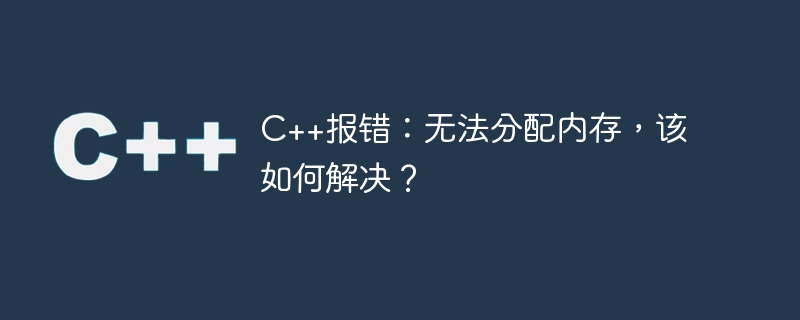

C is a powerful programming language, but you may also encounter errors during use. One of the common errors is "Unable to allocate memory". So, when we encounter this error, how to solve it?
First of all, we need to make it clear that when we write a C program, we need to allocate memory manually. This means we need to create a pointer and allocate space to it. This process requires programmers to manually control and ensure that the allocated space is sufficient.
When we allocate insufficient space, the "Unable to allocate memory" error will occur. This error is related to which function we use when allocating space. In C, there are two commonly used functions for allocating memory: new and malloc. Below we will introduce them respectively and how to solve the errors.
Using new to allocate memory is a common way in C. When we need to create an object or array, we usually use the new operator to allocate memory. For example:
int* myArray = new int[100];
This statement will create an array containing 100 integers and return a pointer to the beginning of the array. After using the array, we need to manually release the space:
delete[] myArray;
If we encounter the "Unable to allocate memory" error when using new to allocate memory, there may be the following reasons and solutions:
malloc is a commonly used memory allocation function in C language and can also be used in C. The code for using malloc to allocate memory is as follows:
int* myArray = (int*)malloc(100 * sizeof(int));
This statement will create an array containing 100 integers and return a pointer to the starting position of the array. After using the array, we need to manually release the space:
free(myArray);
If we encounter the "Unable to allocate memory" error when using malloc to allocate memory, there may be the following reasons and solutions:
Summary
In C programming, we need to manually allocate memory, which requires programmers to control memory usage. When we encounter the "Unable to allocate memory" error when allocating memory, we can solve the problem in a targeted manner based on the allocation function used.
It should be noted that when we write a program, it is best to initialize the memory before using it to avoid unknown results. At the same time, releasing memory in a timely manner can effectively avoid memory leaks and "unable to allocate memory" errors.
The above is the detailed content of C++ error: Unable to allocate memory, how to solve it?. For more information, please follow other related articles on the PHP Chinese website!
 mysql error 10060
mysql error 10060
 What are the differences between c++ and c language
What are the differences between c++ and c language
 Recommended learning order for c++ and python
Recommended learning order for c++ and python
 Cost-effectiveness analysis of learning python and c++
Cost-effectiveness analysis of learning python and c++
 Is c language the same as c++?
Is c language the same as c++?
 Which is better to learn first, c language or c++?
Which is better to learn first, c language or c++?
 The difference and connection between c language and c++
The difference and connection between c language and c++
 C++ software Chinese change tutorial
C++ software Chinese change tutorial




